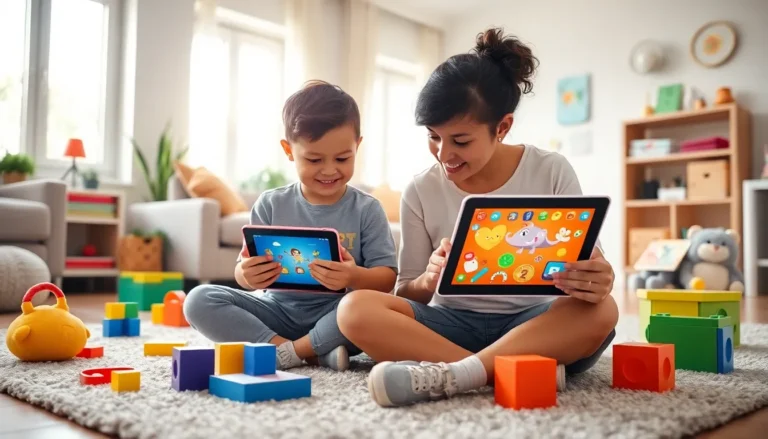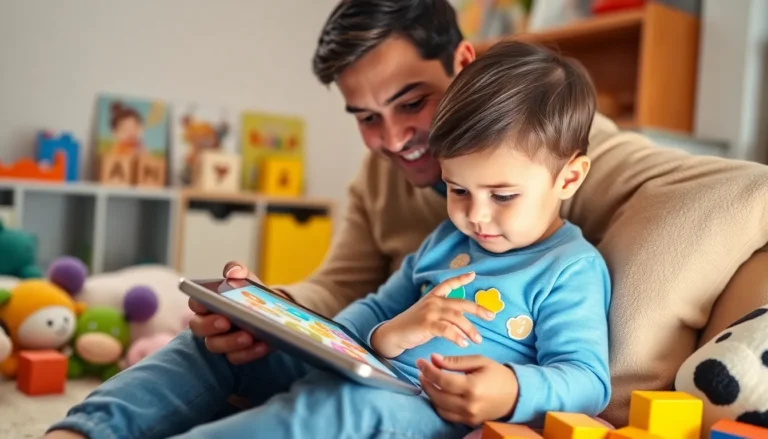In a world where toys often come with flashy lights and endless sounds, Montessori educational toys stand out like a quirky uncle at a family reunion. These gems focus on hands-on learning, sparking curiosity and creativity in children while keeping their attention longer than a cat with a laser pointer. They’re not just toys; they’re gateways to a world of discovery and self-directed learning.
Montessori toys encourage kids to explore, experiment, and even fail—gasp!—all in a safe environment. With designs that promote problem-solving and fine motor skills, these toys turn playtime into a mini-education session without the boring lectures. So why settle for ordinary when you can equip your little ones with tools that make learning as fun as a treasure hunt? Dive into the world of Montessori toys and watch your child thrive, one playful moment at a time.
Table of Contents
ToggleWhat Are Montessori Educational Toys?
Montessori educational toys are designed to support children’s natural curiosity and learning. These toys often feature simple materials like wood and fabric, promoting sensory exploration. Focus shifts from flashy electronics to hands-on experiences, allowing children to learn through play.
Learning opportunities emerge through open-ended activities. Children engage with toys that require them to manipulate objects, fostering motor skills and critical thinking. Each activity encourages problem-solving, creativity, and independence, key components of the Montessori method.
Many Montessori toys emphasize real-world skills. For instance, toys that mimic household tasks enhance life skills and responsibility. These activities not only entertain but also teach valuable lessons about everyday tasks.
Safety stands as a top priority. Montessori toys usually contain non-toxic materials, ensuring a safe environment for children. Parents can feel confident choosing these toys, knowing they align with Montessori principles.
Educational benefits accompany the playful nature of these toys. Research indicates hands-on learning leads to better retention and understanding. By engaging children physically and mentally, Montessori toys lay a foundation for lifelong learning.
Overall, Montessori educational toys focus on promoting healthy development through engaging play. With options that nurture different skill sets, parents find a wide variety of toys suitable for their children’s growth. Finding the right Montessori toy can significantly enhance a child’s educational journey.
Benefits of Montessori Educational Toys
Montessori educational toys provide numerous advantages for children’s development. These toys foster essential skills, encouraging growth in various areas.
Enhancing Cognitive Skills
Montessori educational toys stimulate cognitive development through hands-on experiences. Engaging with these toys promotes critical thinking and problem-solving abilities. Children learn to connect concepts as they explore different materials, facilitating a deeper understanding of their environment. Research supports that interactive play enhances memory retention and comprehension. Tasks such as stacking blocks or sorting shapes encourage spatial awareness. Activities that involve real-world scenarios help bridge the gap between theoretical knowledge and practical application. Through these interactions, children develop a foundation for academic success and lifelong learning.
Promoting Independence
Independence flourishes when children engage with Montessori educational toys. These toys encourage self-directed play, allowing kids to explore at their own pace. Opportunities to make choices foster confidence in their abilities and decision-making skills. Montessori toys often include open-ended activities that inspire creativity and innovation. Implementing real-life tasks reinforces a sense of responsibility, as children learn to care for their environment and accomplish goals. Parents notice a marked improvement in self-sufficiency as children practice skills through play. Overall, engaging with these toys builds resilience and self-esteem in children, preparing them for future challenges.
Types of Montessori Educational Toys
Montessori educational toys encompass various types, each designed to enhance specific skills and learning experiences. They include sensory toys, practical life toys, and educational manipulatives.
Sensory Toys
Sensory toys stimulate a child’s senses through texture, sound, and movement. These toys engage children in tactile exploration, allowing them to learn about different materials. Items like textured blocks and sensory bins foster curiosity and improve fine motor skills. They also promote hand-eye coordination and cognitive development. By providing opportunities for sensory play, these toys encourage the exploration of the environment, facilitating creative and critical thinking.
Practical Life Toys
Practical life toys emphasize everyday skills and routines, supporting independence and responsibility. Tools such as child-sized kitchen utensils and gardening sets enable children to perform real-life tasks. These toys nurture fine motor skills and coordination, laying a foundation for later learning. They teach children the importance of self-sufficiency and confidence through engaging activities. By practicing daily chores, children develop essential life skills that contribute to their overall development.
Educational Manipulatives
Educational manipulatives focus on hands-on learning, promoting problem-solving and critical thinking. Examples include stacking toys, puzzles, and building sets that encourage creativity and mathematical understanding. These toys allow children to physically manipulate objects, deepening their understanding of abstract concepts. Interacting with manipulatives enhances cognitive development and reinforces various subjects. By engaging with educational manipulatives, children gain valuable skills in a fun and interactive manner.
Choosing the Right Montessori Educational Toys
Selecting appropriate Montessori educational toys enhances children’s learning experiences. Consider factors like age, quality, and safety to ensure the best choices.
Age Appropriateness
Different developmental stages demand specific toy features. Toys suitable for infants focus on sensory stimulation, promoting exploration through textures and sounds. As toddlers grow, they benefit from toys that encourage fine motor skills and problem-solving. For preschoolers, educational manipulatives reinforce cognitive skills through hands-on activities. Always match the toys with each child’s current abilities and interests to promote engagement and effective learning. Choosing age-appropriate toys fosters confidence and supports independent exploration.
Quality and Safety
Prioritize high-quality materials when selecting Montessori toys. Natural materials like wood and fabric enhance tactile experiences, encouraging sensory exploration. Non-toxic finishes ensure safety, protecting children during play. Check for certifications that confirm adherence to safety standards, especially for toys intended for younger children. Quality toys last longer and withstand active play, providing better value. Inspect toys for small parts that could pose choking hazards, ensuring every choice supports safe, enjoyable learning experiences. Investing in safe, durable toys contributes to a nurturing learning environment.
Montessori educational toys offer a transformative approach to learning that blends play with essential skill development. By prioritizing hands-on experiences and real-world tasks, these toys not only engage children’s curiosity but also nurture their independence and critical thinking abilities. Selecting the right toys tailored to a child’s developmental stage ensures a rich learning environment that fosters growth and exploration.
Investing in high-quality, safe Montessori toys paves the way for a fulfilling educational journey. As children interact with these thoughtfully designed tools, they build a strong foundation for lifelong learning while enjoying the process. Embracing Montessori principles can truly enhance a child’s playtime, making it both enjoyable and educational.








